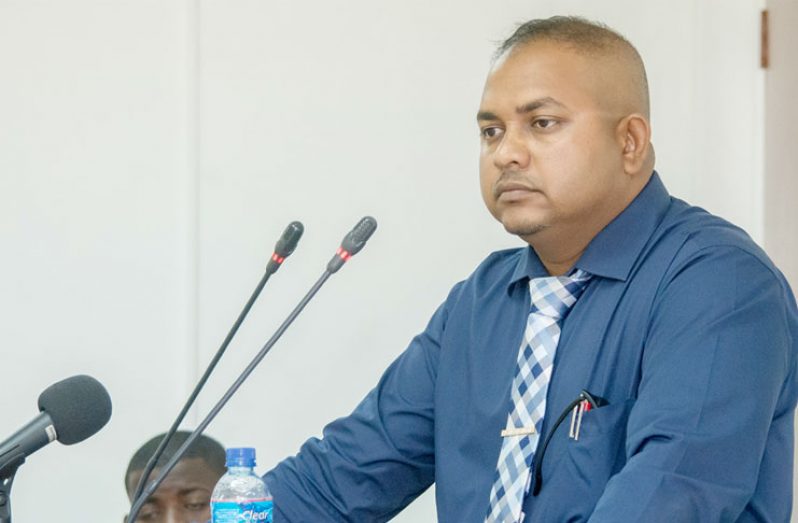…CID inspector
INSPECTOR Prem Narine, one of the officers attached to the Criminal Investigations Department (CID) on Friday maintained that Andriff Gillard and Nizam Khan, the duo accused of plotting to kill President David Granger, ought to have been kept in custody for at least 72 hours.
Narine, during his second appearance before the Commission of Inquiry (CoI) into the matter, during cross-examination by attorney Glen Hanoman, said given the nature of the offence, incitement to commit murder as recorded in the station diary, both Gillard and Khan ought to have remained in custody.
The two men were released on bail less than 24 hours after their arrest. Asked whether the decision to release the duo goes against his personal policy to lock up persons arrested, Narine replied, “It can’t go against my policy…I didn’t make that decision.”
During his evidence-in-chief, Narine said it was Commissioner of Police Seelall Persaud who had instructed him to release the men.
“It is my policy to keep persons in custody until instructed to release them. It is not against the law,” said Narine. But Hanoman, who represents Persaud, begged to differ.
“You are wrong… the laws prevent you from keeping people beyond 72 hours, it doesn’t allow you, “said the attorney, who suggested that it is a very backward tool to keep people in custody because a serious allegation is made and it is not in keeping with modern principles.
“I don’t see it that way sir,” replied Narine, who noted that on March 29, sometime in the evening he received a call from the police commissioner who told him bail should be granted to his (Seelall’s) friend Imran Khan, his brother Nizam Khan and Gillard.
He told the commission that he did not take contemporaneous notes of his conversation with Persaud, but he reported immediately what he was told by Persaud to head of the Major Crimes Unit, Assistant Superintendent Mitchell Caesar.
“The reason you may want to mislead this tribunal is because you don’t want to take responsibility for giving bail to a man alleged…you want to put this on someone else…you realised it would be political suicide for you to take responsibility for this bail decision,” suggested Hanoman.
Narine rejected the suggestion, noting that “I don’t regard that decision as anything political” causing the attorney to suggest even further that such a decision might affect his promotion.
“Whatever decision I made, I am a professional and I stand with my decision. I don’t make it because of political interference, I am a policeman…as a result, I have never lied to this commission and I don’t intend to,” declared Narine.
Hanoman then put it to Inspector Narine that he did not relay the exact words uttered by the commissioner of police when he was called, but gave it his own interpretation. “I reported to Mr. Caesar and this commission, the words to the effect meaning the same thing the commissioner meant when he spoke,” said the policeman, who accepted that Persaud did not use the word ‘instruct’ in his utterance, but his words used amounted to an instruction.
“From my 17 years as a police officer, I have never had any of my senior officers instructing me…they would basically tell me what they want me to do. Being a disciplined rank and in a disciplined organisation, they don’t have to tell me that they are instructing me; I understand the instruction…” added Narine.
The Inspector was then asked why he felt it necessary to speak with Caesar after speaking with the Top Cop. He said he believed that instructions should not have come from Persaud given that he was on leave. “That was my belief and that’s why I spoke to Caesar,” said Narine, who noted that it was when Caesar told him to put Khan on bail that he facilitated same.
“You know when Mr. Persaud is on leave he is still the commissioner of police?” asked the attorney to which Narine responded in the affirmative.
“Do you agree with me that the primary issue during that conversation related to Imran Khan?” asked Hanoman, to which Narine replied, “It started with Imran Khan, but that wasn’t the primary reason.”
He told the commission that when Persaud called him, he was asked what was happening in relation to Imran and Nizam Khan. As a result, I told him what was happening and what was reported to me, which was that Imran Khan was behaving in a disorderly manner before he [Narine] arrived at the station.
“Let me suggest to you that you told Mr. Persaud on the phone, that this chap Gillard, is bare lie he talking,” said Hanoman. Inspector Narine vehemently denied the suggestion, stating that it would have been impossible for him to suggest such or form an opinion that Gillard was lying.
“As I would have testified before, I only became aware of these matters mere minutes before I got to CID that night. When I got there, I had no time to read any statements…he [Sergeant Petamber] reported the basic content of that statement which forms the report…I wasn’t privy to any other statement from any other person, so there is no way that I could have suggested or formed the opinion that Gillard is lying at that time.”
He said too, that he knew nothing of Gillard’s background on March 29 and as such he was not in a position to form an opinion on the matter. Narine denied too that he had misinterpreted what Persaud said to him on the phone on March 29.
Meanwhile, attorney representing the interest of the Police Force, Ian Chang, questioned whether the Special Branch unit of the force was part of the investigation from the inception. Narine was not in a position to state. Chang then asked whether the crime of treason was ever part of his mind during the course of the investigation, to which Narine responded in the negative.



.jpg)









